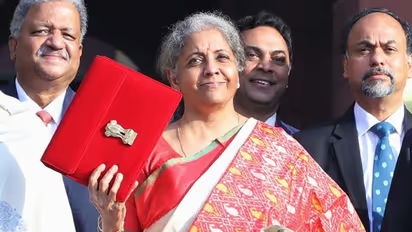Budget 2022: FICCI gives 12 suggestions to Finance Minister Nirmala Sitharaman

Synopsis
Federation of Indian Chambers of Commerce and Industry gives its wishlist to Finance Minister Nirmala Sitharaman.
With just over two weeks are left for the Union Budget to be presented on February 1, the industry body Federation of Indian Chambers of Commerce and Industry has suggested 12 recommendations that it expects Finance Minister Nirmala Sitharaman to take into considerations while preparing the document.
Let us take a look at some of the key recommendations:
1) Providing interest subsidy to house loan seekers: FICCI wants the Centre to boost the housing and real estate sector: FICCI says that this sector can be a force multiplier for growth and for kickstarting investments and the Capex cycle. For a period of upto four years, an interest subsidy of three to four per cent on housing loans could also be offered.
2) Regular subsidy to PMUY beneficiaries: Rather than regular subsidies on every refill, the subsidy component under the PMUY scheme has focused more on providing new gas connections and free first refills. Three free cylinder refills were offered to PMUY recipients in the aftermath of the first wave of the Covid pandemic. However, affordability has become a major challenge for such households for using cooking gas considering the increase in gas prices off-late. FICCI suggested that the government should subsidise the usage of up to seven cylinders in a year.
3) Raise collateral-free loans to Rs 5 crore from Rs 2 crore under Credit Guarantee Fund Trust for Micro and Small Enterprises: FICCI recommends increasing collateral-free loans under CGTMSE to Rs 5 crore. FICCI has suggested that there should be automatic publishing of GST registered MSMEs’ invoices on TReDS to ensure timely payments to the MSMEs.
4) Extending the cut-off date for commencing manufacturing operations under a concessional tax regime. The industry body has suggested extending the sunset date for newly-incorporated domestic firms to commence their manufacturing from March 31, 2023, to March 31, 2025.
5) On the infrastructure development front, the industry association urged the government to resolve the issue of non-fund credit to the infrastructure sector. Bank guarantees are a major problem in it. To ensure that the single-biggest obstacle to rapidly completing construction under the National Infrastructure Pipeline is going for revolving bank guarantees or Insurance Surety Bonds.
6) FICCI has also requested the government to come out with a quarterly bidding calendar for the National Monetisation Pipeline and the National Infrastructure Pipeline to facilitate active participation of the private sector.
7) National Bank for Financing and Infrastructure Development should be operationalised at the earliest as it is a transformative initiative.
8) Government must consider deferment of the proposal of the Faceless Scheme for conducting Income Tax Appellate Tribunal proceedings in the backdrop of substantial litigation related to faceless assessment.
9) Set up Dispute Resolution Committee to ensure timebound resolution of cases. Additionally, FICCI has called for the need to expand the Dispute Resolution Committee's scope to mid-sized and large-sized taxpayers by removing the disputed addition and caps of returned income of Rs 10 lakh and Rs 50 lakh respectively. Moreover, the DRC should be allowed to resolve specific issues instead of the entire appeal.
10) FICCI has also suggested tax incentives for the promotion and adoption of green technology in India. These include offering a 15 per cent concessional tax rate to firms that invest in green technologies on or after a specified date and allowing full deduction towards investment/purchase of green technology assets. This, according to FICCI, will encourage the replacement of obsolete technology with green technology.
11) Provide a credit guarantee scheme for rooftop solar projects in the residential segment, considering they can easily contribute about 15 per cent to the total rooftop solar capacity
12) The industry body sought a mechanism to remove impediments for companies wanting to raise fresh funds and firms wanting to re-organise themselves but finding it difficult due to the valuation. FICCI cited anti-abuse provisions of Sec 50CA and Sec 56(2)(x) and said that they create tax hurdles for several bonafide share transactions in situations like fresh allotment of shares under different modes like a preferential allotment, rise in the value of shares between the date of agreement and consummation of transaction, rights issue without change in control, bonus issue, etc.
Stay updated with all the latest Business News, including market trends, Share Market News, stock updates, taxation, IPOs, banking, finance, real estate, savings, and investments. Track daily Gold Price changes, updates on DA Hike, and the latest developments on the 8th Pay Commission. Get in-depth analysis, expert opinions, and real-time updates to make informed financial decisions. Download the Asianet News Official App from the Android Play Store and iPhone App Store to stay ahead in business.